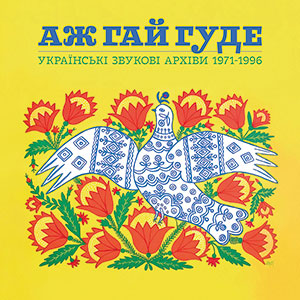Even the Forest Hums: Ukrainian Sonic Archives 1971-1996
Author: Yurii Bereza
View album and artist detailsAlbum and Artist Details
Artist/band: |
VARIOUS ARTISTS |
Label: |
Light in the Attic |
Magazine Review Date: |
December/2024 |
American label Light in the Attic, which specialises in publishing rare music, now release a compilation of Ukrainian music from the 20th century. Ukrainian label Shukai Records, which does the same work within their own country, helped with the release – Shukai in Ukrainian means ‘To Look For.’ A big part of the compilation was recorded under strict Soviet control. Curators spent nearly five years bringing the pieces together.
In Even the Forest Hums… you can recognise jazz fusion (from the Shapoval Sextet led by Oleksandr Shapoval), Latin American jazz (Vodohrai) and the influence of Kraftwerk (Vadym Khrapachov). You can also find post-punk without an overt Soviet vibe, classic disco, quasi progressive rock opera (Kyrylo Stetsenko), world music (Er. Jazz) and the unbelievable Ihor Tsymbrovsky, whose works are not easy to fit into any musical style.
You can follow the history of Ukrainian music created under the Iron Curtain, too. The 18 tracks were recorded by different bands from the 1970s through to the collapse of the Soviet Union in 1991. Even in a reality where the walls had eyes and ears, Ukrainian bands were creating modern music. The compositions presented here are mostly instrumental, though they did not fit the party’s policy then. Slogans such as ‘Today you play jazz. Tomorrow you betray your country,’ were common in the propaganda of the time.
Soviet (and then Russian) media were always trying to convince their audience that Ukraine was only an appendage to the USSR inhabited by helpless hochly (basically meaning yokels, a derogatory term for Ukrainians) in red pants. This propagandist machine was and is very influential in its repressive power. The Iron Curtain, which hid Ukraine from everybody, provided the opportunity to set some rules. Mostly these were cruel and unfair. However, the Curtain wasn’t that thick and Western culture found its way in. On the other side of the curtain, these doses of other cultures and life were devotedly awaited, and greedily consumed. Under the impact of Ukrainian traditions, they transformed into something special.
The Kyiv-based filmmaker and writer Vitalii Bardetskyi, who wrote the album’s liner notes, remarks that the compilation can be divided into two parts. The first is more commercial and the second more underground. The first ends with ‘Silence’ by Valentina Goncharova, the perfect transition between the two segments; calm and safe, but so unusual for that period at the same time. The second part starts with Radiodelo’s ‘90’ and its repetitive, dirty sound.
This separation allows one to mark the weakening of the Soviet Union’s cultural censorship grip. This was happening not because party officials wanted it, or because of Mikhail Gorbachev’s Glasnost (a 1980s policy aimed at more ‘open discussion of political and social issues’). It was because of the USSR’s inevitable and rapidly approaching end. The closer it came, the more clearly people understood that censorship and prohibitions soon would be a thing of the past.
This is not only a beautifully collected and arranged compilation, it is also a historical document. ‘Music has always pulled Ukrainians out of the abyss. When there is no hope for the future, there is still music,’ Vitalii Bardetskyi writes. It is true. Ukraine and its musical heritage are still here.

